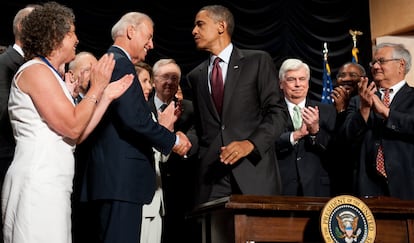The United States, the ‘Captain America’ of financial regulation
In a fragmented planet where populism is advancing, the Joe Biden administration has realized that its power in the markets is proportional to its capacity to impose sanctions


Americans call it “the crack-up.” Economies are behaving like scared bivalves and hiding in their own shells. Protectionism, the economists call it. On the sand, populism from either end of the political spectrum is on the rise. The golden age of globalization — according to work by the Asian Hinrich Foundation — lasted almost 15 years, between 1993 and 2007. The value of trade increased by 6.8% annually, foreign direct investment flows grew by 21.3% in the period, and global wealth increased by 3.4% annually. It brought political liberalization, technological advances, multilateralism, and an unprecedented increase in trade, investment and economic development. Maybe it all ended when Donald Trump said: “I try to learn from the past, but I plan for the future by focusing exclusively on the present. That’s where the fun is.” The “present” and the “fun” for world trade is that bivalve, but what about financial movements? Are investments and their regulation also in hiding?
The omens are uncertain. The increasing fragmentation of the European banking system is a “failure” that increases financial vulnerability and burdens everyone with higher costs. This is the warning issued in the Financial Times by Andrea Enria, former head of supervision at the European Central Bank (ECB). His biggest “personal regret” was seeing how the eurozone market was “becoming more and more segmented” and countries were “guided along national lines.” If a shock arises that affects one part of the banking union, the sector does not function as it should, that is, absorbing losses in one country through profits in another, he warned. The mechanism — which oversees the bloc’s 110 largest and most consistently important banks — held up when a liquidity crisis at Credit Suisse caused it to be acquired by rival UBS. Or when Silicon Valley Bank and Signature Bank failed in the United States. “But there is enormous tension in financial regulation,” agrees José García Montalvo, a professor of economics at Pompeu Fabra University (UPF) in Barcelona, Spain.
For once, it seems that all voices have struck the same tone. “The biggest risk facing the regulation of the financial space is its fragmentation, which is seen clearly in areas such as sustainability,” agrees Francisco Uría, global partner in charge of banking and capital markets at KPMG. A more financially united Europe could improve its economic resilience and strengthen the euro as an international currency. However, achieving this union, explains Sergio Ávila, an IG analyst, requires a deep political commitment, and bridging ideological and national differences between member states. And many will wonder, for example, what Hungary has in common with France.
In July 2010, the Dodd-Frank Act was passed, representing the most important reform of the American financial system since the Great Depression. It was signed into law by then-president Barack Obama. In principle, according to José Manuel Amor, a partner at the Spanish consultancy AFI, it prevented the emergence of institutions considered “too big to fail,” it reinforced consumers (by creating the Consumer Financial Protection Bureau), it forced banks to undergo stress tests, higher levels of capital and a system of orderly liquidation of “failed” financial institutions. Donald Trump — it was predictable — changed the regulations. “He offered regulatory relief to small and medium-sized banks, raising the stress test threshold from $50 billion to $250 billion in total assets,” the expert recalls. President Joe Biden, in his “now” moment, has increased investor protection and the stability of the system.
Perhaps, he did so thinking about what is coming. 2024 is, perhaps, the most important election year in history. People are being asked to vote in the United States, India, and in three of the world’s most populous nations (Indonesia, Bangladesh, and Pakistan). Furthermore, 500 million Europeans will go to the polls in EU parliamentary elections. It will undoubtedly affect that fragmented system. These years of wars, trade crises and inflation have proven something. “The United States has realized the financial power it has [in the traditional sense] and also over data,” reflects Federico Steinberg, principal researcher at the Elcano Royal Institute think tank. “Where this impact has been seen is in its ability to economically sanction Russia, India, or China. Because, when it comes to doling out punishment, America is aligned with Anglo institutions.” They’re the boss.
A coin toss
With the arrival of populism, “after decades of deregulation and globalization, we have entered a time of neo-autarky and that implies more regulation and more uncertainty,” says the economist José Carlos Díez. Without mentioning it, it is as if he were pointing to Argentina. It’s a coin toss. The country owes $43 billion to the International Monetary Fund, it has devalued the peso, eliminated nine of the 18 government ministries, and committed to cutting subsidies and destroying what its president, Javier Milei, calls the “caste.” This, against the background of an economy that contracted 2.7% last year and with rising inflation in December. But populist mistakes have to be paid for, and the idea of lowering taxes will have to be cornered. The consulting firm Econviews estimates that the Argentine government could lose 0.8% of GDP in tax collection this year.
Meanwhile, the coin continues to spin in space: heads or tails. “In general, populist leaders have a tendency to ignore international regulations and this fits well with their desire to impose tariffs, stop immigration, and close their economies,” says Montalvo. By the way, the banking regulation framework used in Europe, Basel III, is stricter that the one in the United States. “In the U.S., the regulation that is being developed would apply to banks with more than $100 billion in assets, which would leave out medium and small banks,” notes Francisco Uría. If Trump wins the election, he will change that for sure. All leaders should remember the quote by sociologist Karl Polanyi (1886-1964): “There is no economy outside the society that created and sustains it.”
Sign up for our weekly newsletter to get more English-language news coverage from EL PAÍS USA Edition
Tu suscripción se está usando en otro dispositivo
¿Quieres añadir otro usuario a tu suscripción?
Si continúas leyendo en este dispositivo, no se podrá leer en el otro.
FlechaTu suscripción se está usando en otro dispositivo y solo puedes acceder a EL PAÍS desde un dispositivo a la vez.
Si quieres compartir tu cuenta, cambia tu suscripción a la modalidad Premium, así podrás añadir otro usuario. Cada uno accederá con su propia cuenta de email, lo que os permitirá personalizar vuestra experiencia en EL PAÍS.
¿Tienes una suscripción de empresa? Accede aquí para contratar más cuentas.
En el caso de no saber quién está usando tu cuenta, te recomendamos cambiar tu contraseña aquí.
Si decides continuar compartiendo tu cuenta, este mensaje se mostrará en tu dispositivo y en el de la otra persona que está usando tu cuenta de forma indefinida, afectando a tu experiencia de lectura. Puedes consultar aquí los términos y condiciones de la suscripción digital.








































